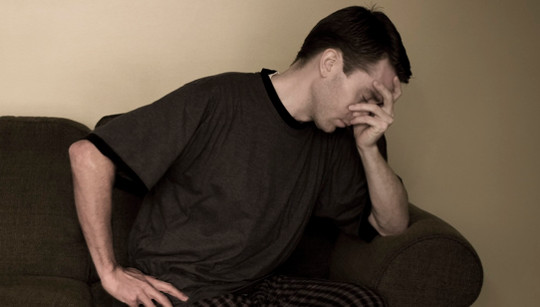
Guilt is a difficult burden to carry around with you. And guilt perpetuates what you are guilty about; how does it do that?
Guilt is a very negative, destructive energy. It is different from remorse, the feeling we get when we know we have done something wrong and we’re dreadfully sorry. In the case of remorse, the antidote is to get the learning so that you don’t repeat your mistake. Guilt, on the other hand, will make you repeat the same mistake because you’re not learning from your mistake!
Guilt is attached to our self-image as a person who ‘should not act like this’ because of certain morals, teachings and beliefs, the self-image we have created as ‘a good person who does not behave like that.’
For example, in some belief systems, masturbation might be considered to be sinful. So a person will feel guilty when he masturbates if he carries or endorses that belief.
With Guilt Comes Blame of Self
Sometimes you might want to forgive yourself for what you did. And then you get into the guilt-forgiveness-repeat cycle, because in order to forgive yourself, you have first judged yourself, and this judgement stays with you. Your self-judgement will ensure that you will repeat the same or similar action. Remember: judgement of what you have done does nothing to heal the past! It creates guilt and guilt creates the great repeater.
In our recent historical past, confession to a priest was popular. I used to go to confession every week! Sins were confessed in order to be forgiven by God. This allowed people to feel they were not going to be punished in hell or purgatory, or even in this life, for having sinned. However, in spite of confessing, the guilt-belief might still be operating within, and the guilty urges as well. In that case, before long, the same sin is likely to be committed again. My own father was a good example of this.
As a Catholic, he went to confession regularly to admit his guilt, be forgiven, and it never ever meant that he stopped doing what he did. It never ever stopped his guilt, either. Guilt, self-blame and forgiveness run in an endless cycle, never finding resolution.
Projection of Guilt
Guilt is a difficult burden to carry around with you. As a result, this feeling often gets projected onto others without you even being aware of it.
In the movie American Beauty, a father suspects his son of being gay and irrationally persecutes him for this suspicion. He is gay himself, but he believes this to be so sinful and shameful that he can’t admit it to himself. However, he is compelled to act out his denied feelings in the end and reveal to all around, and especially to himself, that he is, indeed, the gay person he hated his son for being.
Denial is a way of damming up unwanted, judged energy until it can’t be contained any more. That’s what was demonstrated in American Beauty.
Letting Go of Guilt, Self Judgment and Punishment
Guilt also easily arranges for its own punishment. We do this unconsciously but relentlessly, since we can’t escape the fact that we are creative beings and our thoughts create our reality.
In the case of an overweight woman, or a woman on the way to being overweight who eats comfort food, guilt is created because this act violates her self-image as a person who should be able to cope with life, and should be able to stop eating like this. She blames herself for the unhealthy effects of overeating she is creating or through eating the wrong kinds of food.
Once the guilt is created, this feeling will just be another intolerable emotion to be avoided, and food is able to suppress this very well for a while. It’s very easy to recognise a downward cycle here. Her only way out of this destructive cycle is through loving acceptance of self, no matter what the feeling or action might have been and no matter what her body might look like, and choose remorse instead of guilt, for the poor way her precious body has been treated.
The positive energy of self-acceptance and the resulting remorse interrupt the hold of the circle of destructive energy. When this is achieved, new energy becomes available for new choices, choices resting on self-love and not on self-hatred.
Guilt can be carried within the soul, so that it is carried forward in every lifetime until guilt itself is faced and forgiven, or given up, once and for all. This is a good use of forgiveness. You need to forgive yourself for carting guilt around, especially when you realise what you have done to yourself as a result of your attachment to this emotion. Learning to release judgement is the ultimate healing step toward changing this corrosive pattern.
Guilt Is Not A Virtue
It’s very easy to get attached to guilt if you believe that it is a virtue, as I used to believe myself because that’s what I was taught. Crazy as it might sound, I was taught by my religion that feeling guilty meant being humble! But I was very wrong.
The ‘humbleness’ that comes from guilt is just a self-put-down and extinguishes self-esteem. It’s not true humility because it’s not based on the truth that we were never judged by God, or Spirit. Guilt makes us crazy and urges us to repeat what we are guilty of.
Our negative ego will use this strong conditioning in us to try to defeat us, time and time again. So read this chapter carefully and come back to it again and again, till your very soul gets the message.
Guilt is nothing but a destructive force and no positive energy can ever be created out of it.
Releasing guilt, on the other hand, can bring us to true humility, and that is a virtue like no other!
©2016 by Carla van Raay. All Rights Reserved.
Published by Changemakers Books.
Article Source
 Healing from Abuse - A Practical Spiritual Guide
Healing from Abuse - A Practical Spiritual Guide
by Carla van Raay.
Click here for more info and/or to order this book.
About the Author
 Carla van Raay migrated to Australia in 1950 from the Netherlands. She was a Catholic nun until age 31; left and became a sex worker: both life choices based on early sexual abuse. Her memoir God’s Callgirl became a best seller in several countries. Carla has resided in Western Australia since 1980 as teacher, author and spiritual mentor. She is a mother and grandmother.
Carla van Raay migrated to Australia in 1950 from the Netherlands. She was a Catholic nun until age 31; left and became a sex worker: both life choices based on early sexual abuse. Her memoir God’s Callgirl became a best seller in several countries. Carla has resided in Western Australia since 1980 as teacher, author and spiritual mentor. She is a mother and grandmother.



























